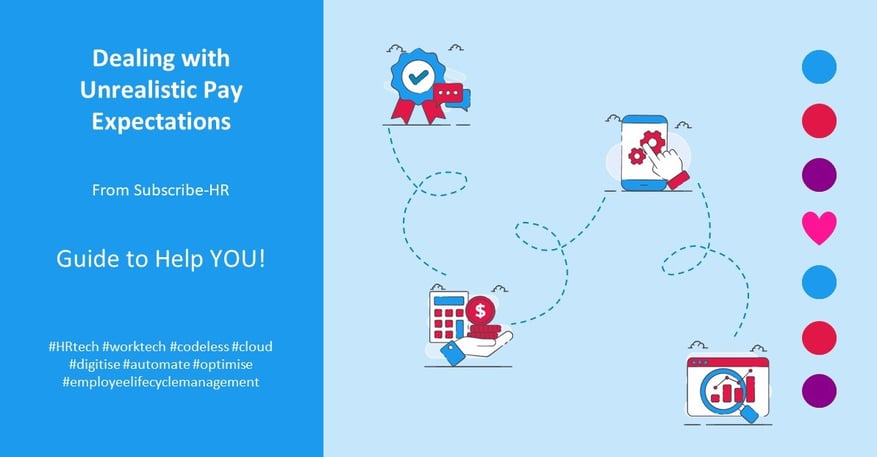In an era where financial pressures tighten their grip on the global economy, employees' expectations in terms of salary are growing.
But this discrepancy between employees’ expectations and your organisation’s realistic financial capacity can create frustrations and even conflicts if left unresolved. 💣
What's the best way to handle this scenario both effectively and professionally, ensuring you retain the candidate and protect your budget? Let’s find out ⬇️

What today’s employee’s salary expectations are
The expectation of salary increases
People at Work, a 2023 study conducted by ADP Research made some telling observations about what employees are anticipating in terms of salary increases.
➡️ A staggering 83% of workers are setting their sights on an average salary increase of 8.3% for the year ahead
➡️ Approximately 10% of workers have their sights set even higher, expecting salary increases exceeding 15%
➡️ Another 18% fall within the range of expecting salary bumps between 10% and 12%
Why this increase is happening
One of the primary catalysts behind these varying expectations is the candidate-driven talent market. In such a market, candidates are proactively approached by recruiters and organisations offering more generous salaries for similar roles. This dynamic creates a disconnect between supply and demand, with employees becoming acutely aware of their market value.
Misalignment is a fundamental driver of elevated salary expectations. As certain skill sets become increasingly sought after, employees possess the leverage to negotiate for higher pay. Employers are often compelled to meet these demands to secure top talent.
Another critical factor at play is the ongoing cost-of-living crisis. As living expenses continue to rise, employees naturally seek ways to increase their income to maintain their quality of life. This external pressure further contributes to the upward trajectory of salary expectations. 📈

How important pay is in employee retention
💵 It's no secret that salary consistently ranks as the most crucial job factor for employees across various industries and sectors. According to a recent Gallup survey, 61% of workers have identified salary as their top consideration when evaluating job opportunities.
The importance of pay is further underscored by the ever-present challenges posed by the cost of living. As expenses for housing, healthcare, education, and daily essentials continue to mount, employees are left grappling with the need to secure higher incomes.
The other employee retention factors that come into play
While pay is undeniably a critical factor in employee retention, it is not always the most important factor for every individual or in every situation.
Employee retention is influenced by a combination of parameters such as 👇
- Opportunities for career growth and development
- A positive work environment
- Work-life balance
- Job security, recognition
- Company culture
- Quality of relationships with colleagues and supervisors

How to deal with unrealistic pay expectations
Dealing with unrealistic pay expectations can be a delicate yet essential task for HR professionals. We recommend adopting a strategic approach that balances the candidate's aspirations with your organisation's budget and market realities.
Let's explore the initial steps to manage these expectations ⬇️
Understand the market value
The first step in addressing unrealistic pay expectations is to understand the market value of the role and the candidate.
One vital approach is to utilise reputable salary surveys that are specific to the job’s industry and location. These surveys will give you insights into compensation ranges for various job roles, and provide you with a clear picture of the market standard.
Additionally, industry benchmarks are a valuable tool to ensure your salary offerings align with competitors so that you can better attract and retain top talent. 👍
Communicate clearly and transparently
A lot of successful outcomes when dealing with pay expectations involve authentic communication. 📣
When faced with an unreasonable salary request, resist the temptation to deliver a straightforward 'yes' or 'no.' Instead, engage in a constructive dialogue to better understand the candidate's perspective.
Take the time to uncover the motivations behind the candidate's salary expectations ⬇️
- Are they driven by financial constraints, industry standards, or personal circumstances?
- Did they arrive at this figure based on credible market research, or is it arbitrary?
When comes the time to present your salary offer, ensure you transparently explain the rationale behind it. Demonstrate how the offer aligns with market standards, the role's value, and the candidate's qualifications and potential. 🙌
Beyond salary, emphasise the additional benefits and opportunities your organisation provides. This can include career development programs, work-life balance initiatives, a positive workplace culture, and more. Showcase the holistic value of joining your team.
Negotiate and compromise
Addressing unrealistic salary expectations is about empathy, yes, but it also requires a fair amount of skilled negotiation.
Rather than dismissing these expectations outright, we recommend engaging in constructive dialogue to find common ground and reach a mutually beneficial solution. 👍
Start by actively listening to the candidate's concerns and motivations behind their salary expectations. If you’re able to understand their perspective, you’re that much closer to finding a solution that works for both parties.
Look for opportunities for compromise and common ground. Explore areas where you can meet the candidate's expectations to a reasonable extent while staying within your organisation's budget and market constraints.
👉 This can also include various strategies like:
- Providing room for growth
- Performance-based bonuses tied to achieving specific goals
- Flexible schedules that enhance work-life balance
Takeaway

There’s no ignoring that employees’ salary expectations are on the rise. The key to retaining top talent while protecting your budget is proactively addressing this disparity.
Here are some key takeaways ⬇️
- A significant 83% of workers anticipate an average salary increase of 8.3% in the near future, with some expecting even higher raises.
- The candidate-driven talent market, supply-demand misalignment, and the cost-of-living crisis contribute to elevated salary expectations.
- Salary consistently ranks as the most critical factor in job satisfaction, with 61% of workers emphasising its importance.
- Escalating living expenses make competitive compensation vital to retaining employees.
- While pay is crucial, other factors also influence employee retention, including career growth opportunities, work environment, work-life balance, job security, recognition, company culture, and relationships with colleagues and supervisors.
- Utilise salary surveys, industry benchmarks, and competitor analysis to grasp the market value of the role and candidate.
- Engage in authentic dialogue to uncover the motivations behind salary expectations, explain the rationale behind the offer, and highlight additional organisational benefits.
- Actively listen to the candidate's concerns, seek common ground, and explore strategies like providing room for growth, performance-based bonuses, and flexible schedules.
Got any questions? Still need some guidance to navigate through dealing with pay expectations? Contact us! We’re always here to help 🤝
FAQ: Frequently Asked Questions
How do I handle unrealistic pay expectations during an interview?
Addressing unrealistic pay expectations during an interview involves open communication and setting realistic salary expectations based on the role and market standards. It's crucial to understand the candidate's motivations and provide transparent feedback.
Do you have a template for negotiating salary with a candidate via email?
We recommend customising your email based on the specific candidate and situation. However, here's a general template:
Subject: Salary Negotiation Discussion
Hi [Candidate's Name],
I hope this email finds you well. I wanted to discuss the salary for the [Position] role.
We value your experience and qualifications, and we're committed to offering a competitive package that aligns with industry standards. Let's schedule a call to explore your salary expectations and find a mutually beneficial solution.
Please let me know your availability for a conversation.
Best regards,
[Your Name]
What are some tips for recruiters when negotiating salary with candidates?
Some tips include:
- Research market salary ranges.
- Focus on the candidate's qualifications and value.
- Emphasise non-monetary benefits.
- Maintain open and respectful communication.
- Be prepared to compromise within budget constraints.
How can I handle salary negotiations as an employer fairly?
To handle salary negotiations fairly, ensure transparency, base offers on market data, and provide clear reasons for your offer. Consider candidates' qualifications and maintain a respectful tone during negotiations.
Can you provide a conversation example for salary negotiation with HR?
Here's an example of salary negotiation with HR:
HR: We're excited to offer you the [Position] role.
Candidate: I was expecting a higher salary.
HR: We understand your expectations. Our offer is based on industry standards and your qualifications. We can provide opportunities for growth and performance-based bonuses.
What are some salary negotiation tricks for HR professionals?
HR professionals should focus on fairness, transparency, and empathy during salary negotiations. Avoid tricks and prioritise open communication to reach mutually beneficial agreements.
How can I address unrealistic salary expectations from candidates?
Addressing unrealistic salary expectations involves explaining market standards, offering competitive packages, and highlighting non-monetary benefits such as career development opportunities.
How do I establish a fair salary range for a position?
Establishing a fair salary range involves considering market data, industry benchmarks, and budget constraints. It should reflect the role's value to your organisation and align with competitive offerings.
What should I do if a candidate has unrealistic career development expectations?
Addressing unrealistic career development expectations involves discussing realistic growth opportunities within your organisation and aligning them with the candidate's goals and qualifications.

